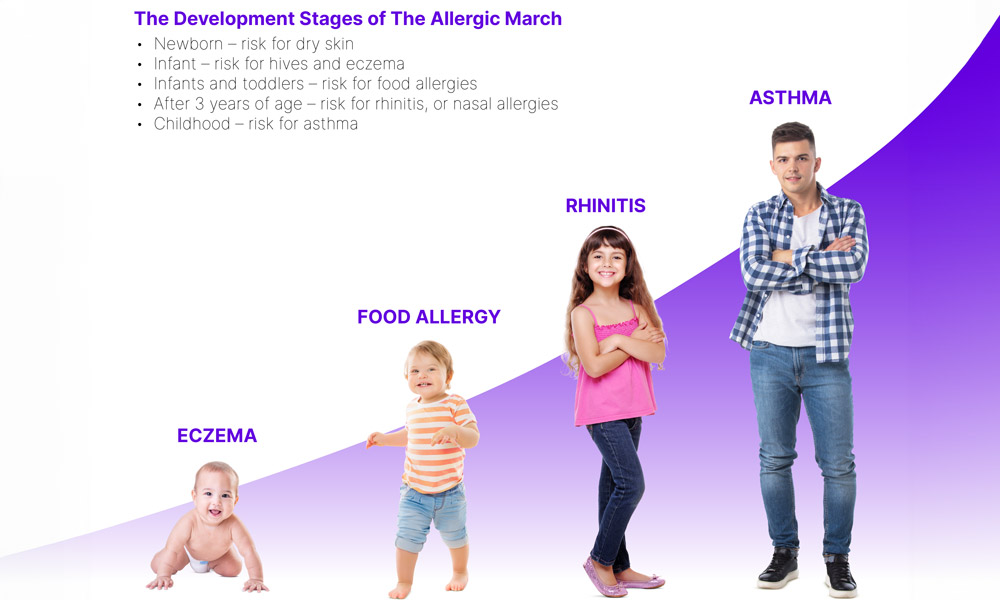
Get ahead of your asthma symptoms

At Allergy & ENT Associates, our team of asthma doctors and specialists recognizes the challenges of living with asthma. We understand the significance of receiving the right treatment to control symptoms and prevent long-term lung damage. Our asthma doctors are committed to finding the cause and helping you prevent and manage your asthma, minimizing its impact on your daily activities and overall quality of life. That’s why we offer personalized care plans tailored to your specific type of asthma.
When to see a specialist
If you’re experiencing any of the symptoms below, it’s time to see an asthma specialist. Don’t wait until your or your child’s asthma symptoms progress to a more severe stage, as this could result in permanent lung damage.
Treating asthma helps you avoid long-term damage to your lungs. You should see a specialist if you experience:
Shortness of breath
Chest tightness or pain
Chronic coughing or wheezing
Trouble sleeping due to symptoms

You may want to see an allergist for asthma treatment. There could be an underlying allergy that exacerbates your asthma.
Asthma may look like:
Our team will develop a custom plan based on the type of asthma you are experiencing. Various factors can trigger different types of asthma, so it’s crucial to consult with an asthma specialist who can help you identify and manage your specific form of illness.
Seasonal asthma – triggered by allergic reactions to allergens such as trees, grasses, or weeds.
Allergic asthma – triggered by allergic reactions to allergens such as pet dander, dust or dust mites, mold, or pollen.
Non-allergic asthma – triggered by irritants in the air that you breathe such as tobacco smoke, wood smoke, room deodorizers, fresh paint, and perfume.
Exercise-induced asthma – triggered during physical activities.
Nocturnal asthma – triggered by exercise or physical activity.
90% of children and 50% of adults have their asthma triggered by allergies. We specialize in developing treatment plans to treat the root cause and provide a preventative approach with less medication use.
Treatment may look like
Experience a personalized care plan crafted just for you, integrating lifestyle changes to minimize triggers. From tweaking daily routines to incorporating a HEPA air filter, maintaining a healthy weight, regular exercise and a balanced diet – we’ve got you covered.
Regardless of the type of asthma you have, treatment is available to control and prevent symptoms. Our team of asthma specialists may recommend:
Biologic therapies
Help with symptom control and prevention for patients with moderate to severe asthma
Allergen Immunotherapy
Discover relief for allergy-induced asthma through allergy injections or oral drops.
At Allergy & ENT Associates, we create personalized treatment plans that address your unique needs. Schedule an appointment with our dedicated asthma specialists for expert care that’s tailored specifically to you.
Asthma Education
Check out these posts with helpful information about asthma treatment.

Spring Take-Back: Beating Pollen Season in Texas
As winter gives way to spring, Texas transforms into a canvas of vibrant colors blooming off the interstate. You’re conflicted.…
Read more
What is the allergic march?
Can your allergies grow over time? The allergic march, also known as atopic march or allergen march, is the phrase…
Read more
5 Historical Figures Who Suffered From Asthma
Asthma is a serious medical condition, but you can still accomplish amazing things. Here are some historical figures with asthma…
Read moreHear from patients like you
Our providers are efficient, effective, and garner high patient satisfaction.
Dr. Kancherla and team are wonderful! My daughter’s quality of life has improved so much since coming here. We highly recommend them for all your allergy and asthma needs!
Robin M.
If you’re experiencing asthma, also consider talking to a specialist about:
18 Offices to Choose From
Find the location most convenient for you. We’ll see you there!
Baytown
7599 Garth Road suite 700, Baytown, Texas 77521, USA
Phone: (281) 425-9313
The Center for Surgery & Advanced Therapeutics
10847 Kuykendahl Road, Suite 150, Spring, TX 77382, USA
Phone: (832) 823-5375
The Woodlands – Town Center
9301 Pinecroft Drive, Suite 100, The Woodlands, Texas 77380, USA
Phone: (281) 364-1001
The Woodlands – Sterling Ridge
10847 Kuykendahl Rd, Suite 100, The Woodlands, Texas 77382, USA
Phone: (281) 364-8001
Clear Lake
561 W. Medical Center Blvd G, Webster, Texas 77598, USA
Phone: (281) 332-2348
Cypress
25250 Northwest Fwy, Ste 100, Cypress, Texas 77429, USA
Phone: (281) 970-7788
Heights
518 West 11th Street, Suite 100, Houston, Texas 77008, USA
Phone: (281) 914-4762
Katy
23543 Kingsland Blvd, Ste 100, Katy, Texas 77494, USA
Phone: (281) 693-0084
Kingwood
1850 West Lake Houston Pkwy, Suite 100, Kingwood, Houston, Texas 77339, USA
Phone: (281) 540-7764
Lake Jackson
210 Lake Road suite 100b, Lake Jackson, Texas 77566, USA
Phone: (979) 297-6503
Louetta
11620 Louetta Road, Suite d, Houston, Texas 77070, USA
Phone: (281) 370-9331
Memorial / Town & Country
8800 Katy Freeway, Suite 250, Houston, Texas 77024, USA
Phone: (713) 461-6711
Montgomery
18059 Highway 105 West, Suite 115, Montgomery, Texas 77356, USA
Phone: (936) 582-6001
Pearland
9223 West Broadway Street, Suite 103, Pearland, Texas 77584, USA
Phone: (281) 412-7111
River Oaks
2415 W. Alabama St, Suite 208, Houston, Texas 77098, USA
Phone: 281-617-1649
Spring
20631 Kuykendahl Road, Suite 100, Spring, Texas 77379, USA
Phone: (281) 453-1001
Sugar Land
1201 Creek Way Drive, Suite A Sugar Land, Texas 77478
Phone: (281) 325-0258
Texas Medical Center
7707 Fannin, Suite 195 Houston, Texas 77054
Phone: (713) 797-0045
Book a same-day appointment
Build a comprehensive treatment plan with our providers
or call us at 713-697-4687 (713-MY-SINUS)
Ask us a question
For information unrelated to booking
an appointment, please use the form below


